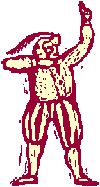
Dionysis -- Biomechanics
Summary
Stanislavsky: "In the creative process there is the father, the author of the play; the mother, the actor pregnant with the part; and the child, the role to be born."Questions
Notes
|
On the Technique of Acting by Michael Chekhov Michael Chekhov, nephew to the Russian playwright and student of Stanislavski, left Russia and his mentor behind to pursue a career as an actor, director, and teacher in Europe and America. While he was an early advocate of Stanislavski, Chekhov differed from the great teacher in important respects, particularly in his insistence on the use of imagination as opposed to memory in creating a role. (In a famous anecdote, Chekhov once performed a "sense memory" exercise in which he broke down over the tragic death of his aunt. When complimented on the truthfulness of his emotion, he admitted that his "aunt" was entirely imaginary.) One of Chekhov's innovations of technique is the "psychological gesture," in which a repeated external action leads to an internal revelation. Due to his insistence on the importance of the physical rather than the simply intellectual, Chekhov's book is as focused on following its series of exercises as it is in study; acting, he would remind us, is always fundamentally a verb. For actors who feel "hemmed in" by an overinsistence on "feeling" a part or in drawing from their own experiences to feed a role, Chekhov's focus on the primal and limitless nature of imagination is tremendously liberating.Simposia, Discussion, Feedback
Dionysos:Apollo:
Meyerhold:
Stanislavsky:

